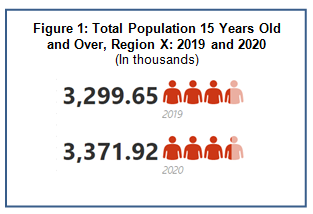
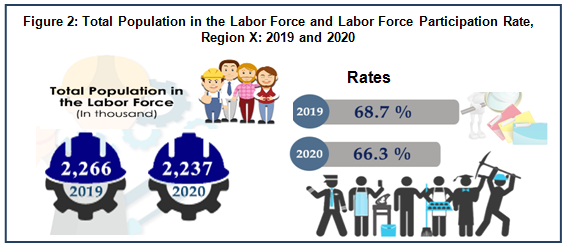
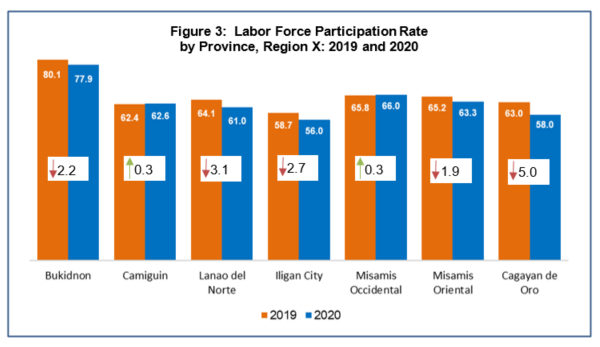
Employment Rate Decreases to 93.6 Percent
Out of the total population in the labor force in 2020, 93.6 percent or about 2.094 million were employed. This is lower by about 2.0 percentage points or a reduction of 71,848 persons from the recorded employed persons in 2019. On the other hand, 6.4 percent or 142,923 persons were unemployed in the region.
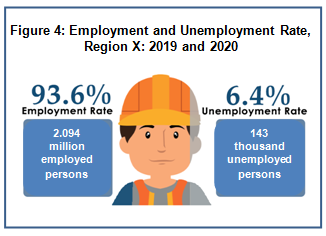
Out of five provinces and two highly urbanized cities in the region, Lanao del Norte had the highest employment rate of 97.5 percent, equivalent to 282,146 employed persons. On the other hand, the province of Misamis Oriental registered the lowest employment rate of 91.6 percent. (Figure 5)
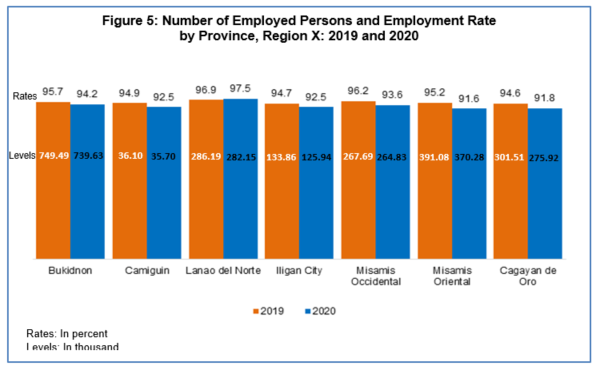
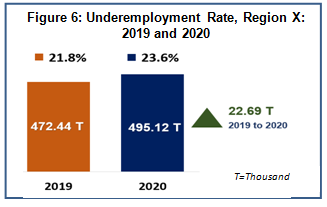
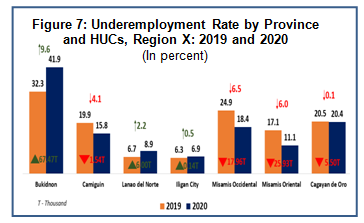
TECHNICAL NOTES OF THE LABOR FORCE SURVEY
Background
The stability and growth of a country’s economy hinges on its ability to produce goods and services for both domestic and international use. Labor represents an important factor of production, hence, the improvement of the quality of the labor force and efforts to make it more productive and responsive to growth are necessary for the development of the economy. A clear knowledge and understanding of the size, composition and other characteristics of the segment of the population is a big step in this direction. A continuing supply of the data on labor force is indispensable to national and local development planning.
The Labor Force Survey (LFS) is a nationwide quarterly survey of households conducted by the Philippine Statistics Authority (PSA) to gather data on the demographic and socio-economic characteristics of the population.
Concepts and Definitions
Employment Status Concepts
· Population 15 Years Old and Over
This refers to number of population 15 years old and over excluding overseas workers. Overseas workers are excluded in the estimation of the size of working population (population aged 15 years and over) since the data on their economic characteristics are not collected because they are not considered part of the labor force in the country.
· In the Labor Force or Economically Active Population
This refers to persons 15 years old and over who are either employed or unemployed in accordance with the definitions described as follows.
Employed
Employed persons include all those who, during the reference period are 15 years old and over as of their last birthday and are reported either:
· At work. Those who do any work even for one hour during the reference period for pay or profit, or work without pay on the farm or business enterprise operated by a member of the same household related by blood, marriage or adoption; or
· With a job but not at work. Those who have a job or business but are not at work because of temporary illness or injury, vacation or other reasons. Likewise, persons who expect to report for work or to start operation of a farm or business enterprise within two weeks from the date of the enumerator’s visit are considered employed.
Underemployed
Underemployed persons include all employed persons who express the desire to have additional hours of work in their present job, or an additional job, or to have a new job with longer working hours. Visibly underemployed persons are those who work for less than 40 hours during the reference period and want additional hours of work.
Unemployed
Unemployed persons include all those who, during the reference period, are 15 years old and over as of their last birthday and reported as:
- Without work, i.e., had no job or business during the reference period; and
- Currently available for work, i.e., were available and willing to take up work in paid employment or self-employment during the reference period, and/or would be available and willing to take up work in paid employment or self-employment within two weeks after the interview date; and
- Seeking work, i.e., had taken specific steps to look for a job or establish a business during the reference period, or not seeking work due to the following reasons: (1) tired or believed no work available, i.e., discouraged workers; (2) awaiting results of previous job application; (3) temporary illness or disability; (4) bad weather; and/or (5) waiting for rehire or job recall.
(Sgd.) JANITH C. AVES, CE, DM
(Chief Statistical Specialist)
Officer-in-Charge

